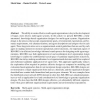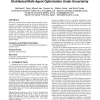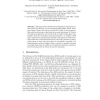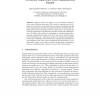112
click to vote
AAMAS
2008
Springer
15 years 2 months ago
2008
Springer
The ability to create effective multi-agent organizations is key to the development of larger, more diverse multi-agent systems. In this article we present KB-ORG: a fully automate...
111
click to vote
HAIS
2008
Springer
15 years 3 months ago
2008
Springer
Design patterns have been recently concerned in the multi-agent community for the design of systems with decentralized coordination. In this paper we present a design pattern for d...
134
click to vote
ECAI
2010
Springer
15 years 3 months ago
2010
Springer
Abstract. Infinite-horizon multi-agent control processes with nondeterminism and partial state knowledge have particularly interesting properties with respect to adaptive control, ...
108
Voted
ATAL
2010
Springer
15 years 3 months ago
2010
Springer
Increasing teamwork between agents typically increases the performance of a multi-agent system, at the cost of increased communication and higher computational complexity. This wo...
122
click to vote
ATAL
2009
Springer
15 years 3 months ago
2009
Springer
Multi-agent systems (MASs), comprised of autonomous entities with the aim to cooperate to reach a common goal, may be viewed as computational models of distributed complex systems ...
141
click to vote
IJCAI
2001
15 years 3 months ago
2001
Psychological studies on teamwork have shown that an effective team often can anticipate information needs of teammates based on a shared mental model. Existing multi-agent models...
EUMAS
2006
15 years 3 months ago
2006
Fault tolerance is an important property of large-scale multiagent systems as the failure rate grows with both the number of the hosts and deployed agents, and the duration of com...
CLIMA
2004
15 years 3 months ago
2004
Abstract. This paper deals with the issue of learning in multi-agent systems (MAS). Particularly, we are interested in BDI (Belief, Desire, Intention) agents. Despite the relevance...
91
Voted
AAAI
2010
15 years 3 months ago
2010
Intentions have been widely studied in AI, both in the context of decision-making within individual agents and in multiagent systems. Work on intentions in multi-agent systems has...
120
click to vote
ATAL
2008
Springer
15 years 4 months ago
2008
Springer
Software systems are subject to ever increasing complexity and in need of efficient structuring. The concept of organization as an exand abstract real-world reference presents a pr...




